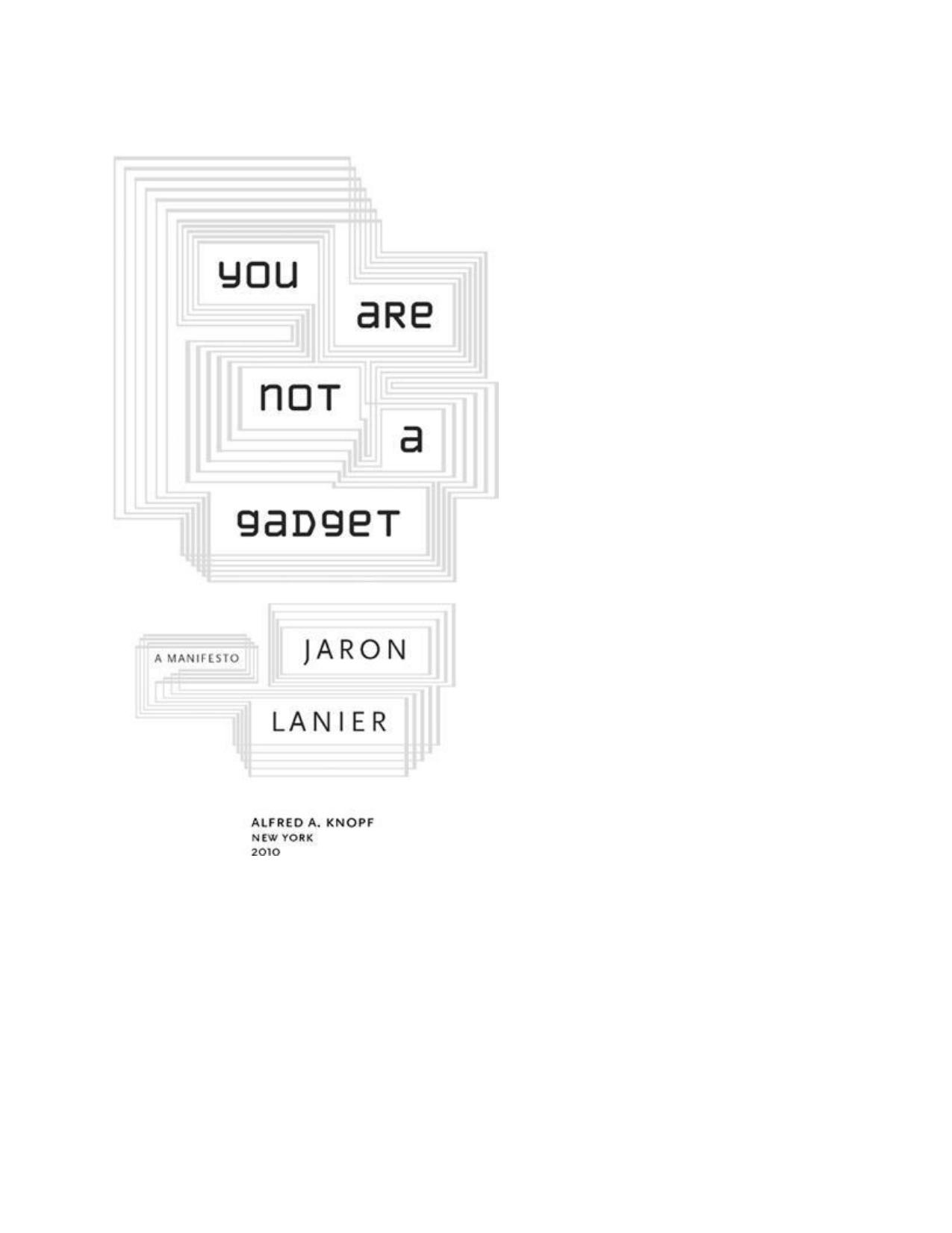You Are Not a Gadget by Jaron Lanier

Author:Jaron Lanier
Language: eng
Format: azw3, epub, pdf
Tags: Science, General
ISBN: 9780307593146
Publisher: Vintage
Published: 2010-01-12T00:00:00+00:00
CHAPTER 7
ALTERNATIVES ARE PRESENTED to doctrinaire ideas about digital economics.
The Digital Economy:
First Thought, Best Thought
A natural question to ask at this point is, Are there any alternatives, any options, that exist apart from the opposing poles of old media and open culture?
Early on, one of the signal ideas about how a culture with a digital network could—and should—work was that the need for money might be eliminated, since such a network could keep track of fractional barters between very large groups of people. Whether that idea will ever come back into the discussion I don’t know, but for the foreseeable future we seem to be committed to using money for rent, food, and medicine. So is there any way to bring money and capitalism into an era of technological abundance without impoverishing almost everyone? One smart idea came from Ted Nelson.
Nelson is perhaps the most formative figure in the development of online culture. He invented the digital media link and other core ideas of connected online media back in the 1960s. He called it “hypermedia.”
Nelson’s ambitions for the economics of linking were more profound than those in vogue today. He proposed that instead of copying digital media, we should effectively keep only one copy of each cultural expression—as with a book or a song—and pay the author of that expression a small, affordable amount whenever it is accessed. (Of course, as a matter of engineering practice, there would have to be many copies in order for the system to function efficiently, but that would be an internal detail, unrelated to a user’s experience.)
As a result, anyone might be able to get rich from creative work. The people who make a momentarily popular prank video clip might earn a lot of money in a single day, but an obscure scholar might eventually earn as much over many years as her work is repeatedly referenced. But note that this is a very different idea from the long tail, because it rewards individuals instead of cloud owners.
The popularity of amateur content today provides an answer to one of the old objections to Nelson’s ideas. It was once a common concern that most people would not want to be creative or expressive, ensuring that only a few artists would get rich and that everyone else would starve. At one event, I remember Nelson trying to speak and young American Maoists shouting him down because they worried that his system would favor the intellectual over the peasant.
I used to face this objection constantly when I talked about virtual reality (which I discuss more fully in Chapter 14). Many a lecture I gave in the 1980s would end with a skeptic in the audience pointing out loudly and confidently that only a tiny minority of people would ever write anything online for others to read. They didn’t believe a world with millions of active voices was remotely possible—but that is the world that has come to be.
If we idealists had only been able to convince those
Download
You Are Not a Gadget by Jaron Lanier.epub
You Are Not a Gadget by Jaron Lanier.pdf
This site does not store any files on its server. We only index and link to content provided by other sites. Please contact the content providers to delete copyright contents if any and email us, we'll remove relevant links or contents immediately.
Sass and Compass in Action by Wynn Netherland Nathan Weizenbaum Chris Eppstein Brandon Mathis(7395)
Grails in Action by Glen Smith Peter Ledbrook(7290)
Kotlin in Action by Dmitry Jemerov(4632)
Management Strategies for the Cloud Revolution: How Cloud Computing Is Transforming Business and Why You Can't Afford to Be Left Behind by Charles Babcock(4125)
The Age of Surveillance Capitalism by Shoshana Zuboff(3405)
Learn Windows PowerShell in a Month of Lunches by Don Jones(3235)
Mastering Azure Security by Mustafa Toroman and Tom Janetscheck(2997)
Mastering Python for Networking and Security by José Manuel Ortega(2930)
Blockchain Basics by Daniel Drescher(2880)
TCP IP by Todd Lammle(2631)
Microsoft 365 Identity and Services Exam Guide MS-100 by Aaron Guilmette(2506)
From CIA to APT: An Introduction to Cyber Security by Edward G. Amoroso & Matthew E. Amoroso(2477)
Hands-On Azure for Developers by Kamil Mrzyglod(2388)
React Native - Building Mobile Apps with JavaScript by Novick Vladimir(2333)
MCSA Windows Server 2016 Study Guide: Exam 70-740 by William Panek(2307)
The Social Psychology of Inequality by Unknown(2301)
The Art Of Deception by Kevin Mitnick(2291)
Configuring Windows Server Hybrid Advanced Services Exam Ref AZ-801 by Chris Gill(2254)
Azure Containers Explained by Wesley Haakman & Richard Hooper(2136)
